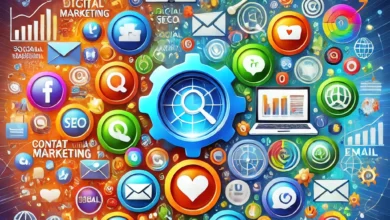A Complete Guide to Digital Marketing for Small Businesses
Introduction
In today’s digital age, the way businesses market their products and services has transformed. Small businesses, once restricted by tight budgets and limited reach, now have access to an array of tools that help them compete in the same space as large corporations. That transformation comes through digital marketing—a dynamic, evolving, and results-driven way to connect with customers online.
But what exactly is digital marketing? And why is it so crucial for small businesses to adopt it?
At its core, digital marketing refers to all online marketing efforts. Businesses leverage digital channels such as search engines, social media, email, and websites to connect with both current and potential customers. Whether you’re selling homemade crafts or providing consulting services, digital marketing provides the opportunity to connect with your audience where they are most active—online.
Importance of Digital Marketing for Small Businesses
Unlike traditional marketing—like billboards, TV ads, or direct mail—digital marketing allows small businesses to reach a targeted audience, track performance, and make real-time adjustments. The beauty of digital marketing lies in its scalability. Whether your budget is large or small, you can find strategies that fit your goals. You can run ads that only target a local community or create content that engages people worldwide.
For small businesses, digital marketing is an excellent equalizer. It’s no longer about who has the biggest budget but about who has the most creative, consistent, and data-driven approach. That’s how a local coffee shop can generate as much buzz online as a nationwide chain.
Understanding Digital Marketing Channels
When diving into digital marketing, it’s important to understand the various channels available. The online landscape is diverse, and each platform offers different opportunities to connect with potential customers. Let’s explore some of the most impactful channels that small businesses can leverage.
Search Engine Optimization (SEO)
SEO is the process of optimizing your website to rank higher in search engine results. When someone types a keyword into a search engine, you want your business to show up on the first page. By doing so, you’re more likely to drive organic traffic to your site, which means more potential customers finding your business without paying for ads.
Pay-Per-Click (PPC) Advertising
Unlike SEO, where results can take time, PPC advertising offers immediate visibility. These are the ads you see at the top of search results or on social media platforms. The beauty of PPC is that you only pay when someone clicks on your ad, making it an efficient way to get quick results. However, PPC campaigns need careful planning to ensure you get the best return on investment (ROI).
Social Media Marketing
With billions of users globally, social media has become a cornerstone for digital marketing. Small businesses can use platforms like social media to connect directly with their audience. It’s not just about sharing posts—it’s about engaging with customers, sharing valuable content, and building a community.
Email Marketing
Despite the rise of social media, email marketing remains one of the most effective tools for small businesses. It allows businesses to nurture leads, promote new products, and maintain a direct line of communication with their audience. The key to successful email marketing is delivering relevant content to a well-targeted list of subscribers.
Content Marketing
Content marketing is all about creating valuable, engaging, and relevant content that speaks to your audience’s needs. Whether through blogs, videos, podcasts, or infographics, content marketing helps build trust and establishes your business as an authority in your industry. The more value you provide, the more likely customers will engage with your brand.
Affiliate Marketing
Affiliate marketing involves partnering with other businesses or individuals to promote your products. Affiliates earn a commission for every sale they help generate, making it a low-risk way for small businesses to expand their reach.
Influencer Marketing
Partnering with influencers—people who have a large, engaged following—can be an effective way for small businesses to reach a wider audience. While it requires careful selection of the right influencers for your niche, it can offer tremendous value for increasing brand awareness.
Search Engine Optimization (SEO)
Now that you know the different digital marketing channels, let’s dive deeper into some of them. First up is SEO.
SEO might seem like a daunting term, but it’s essentially about improving your website so that it appears higher in search engine results. The goal is simple: when someone searches for a product or service you offer, your website shows up at the top.
On-Page SEO Tactics
On-page SEO refers to optimizing elements within your own website. This includes using relevant keywords, creating engaging and informative content, and optimizing titles and meta descriptions. It also involves making sure your site is fast, mobile-friendly, and easy to navigate.
Off-Page SEO Strategies
Off-page SEO, on the other hand, refers to actions taken outside your website to improve your rankings. This includes getting backlinks from other reputable sites, building a presence on social media, and engaging in online forums related to your industry.
Importance of Local SEO for Small Businesses
For small businesses, local SEO is especially important. If you run a brick-and-mortar business, you want to ensure that local customers can find you. This involves optimizing your website for local keywords, ensuring your business is listed on online directories, and encouraging customers to leave positive reviews.
Pay-Per-Click (PPC) Advertising
Moving on to PPC advertising, this strategy provides an immediate way to attract traffic and leads to your website. With PPC, you can target specific keywords and ensure your ads are shown to the right people.
How PPC Works
With PPC, you bid on certain keywords, and when someone searches for that keyword, your ad appears. If someone clicks on your ad, you pay a fee. The beauty of PPC is that it can produce instant results, unlike SEO, which may take months.
Key Benefits of PPC for Small Businesses
The biggest advantage of PPC is the ability to control your budget and measure your success. If a campaign is working, you can allocate more money toward it. If it’s not delivering results, you can tweak it or shut it down immediately, ensuring your money is well spent.
Social Media Marketing
Social media marketing is one of the most effective ways for small businesses to build relationships with their customers. Whether you’re posting product updates, sharing customer testimonials, or engaging with users, social media offers a direct line to your audience.
Why Social Media is Crucial for Small Businesses
More than just a platform to post pictures and videos, social media allows you to build your brand, engage with followers, and even run targeted ads. Unlike traditional marketing, it offers a two-way conversation between you and your customers, fostering loyalty and trust.
Choosing the Right Platform for Your Business
With so many platforms available, it’s important to choose the one that fits your business and audience. For example, if your target audience is younger, platforms like short-video-based sites may be more effective. If you’re in a B2B industry, professional networking platforms could be more suitable.

